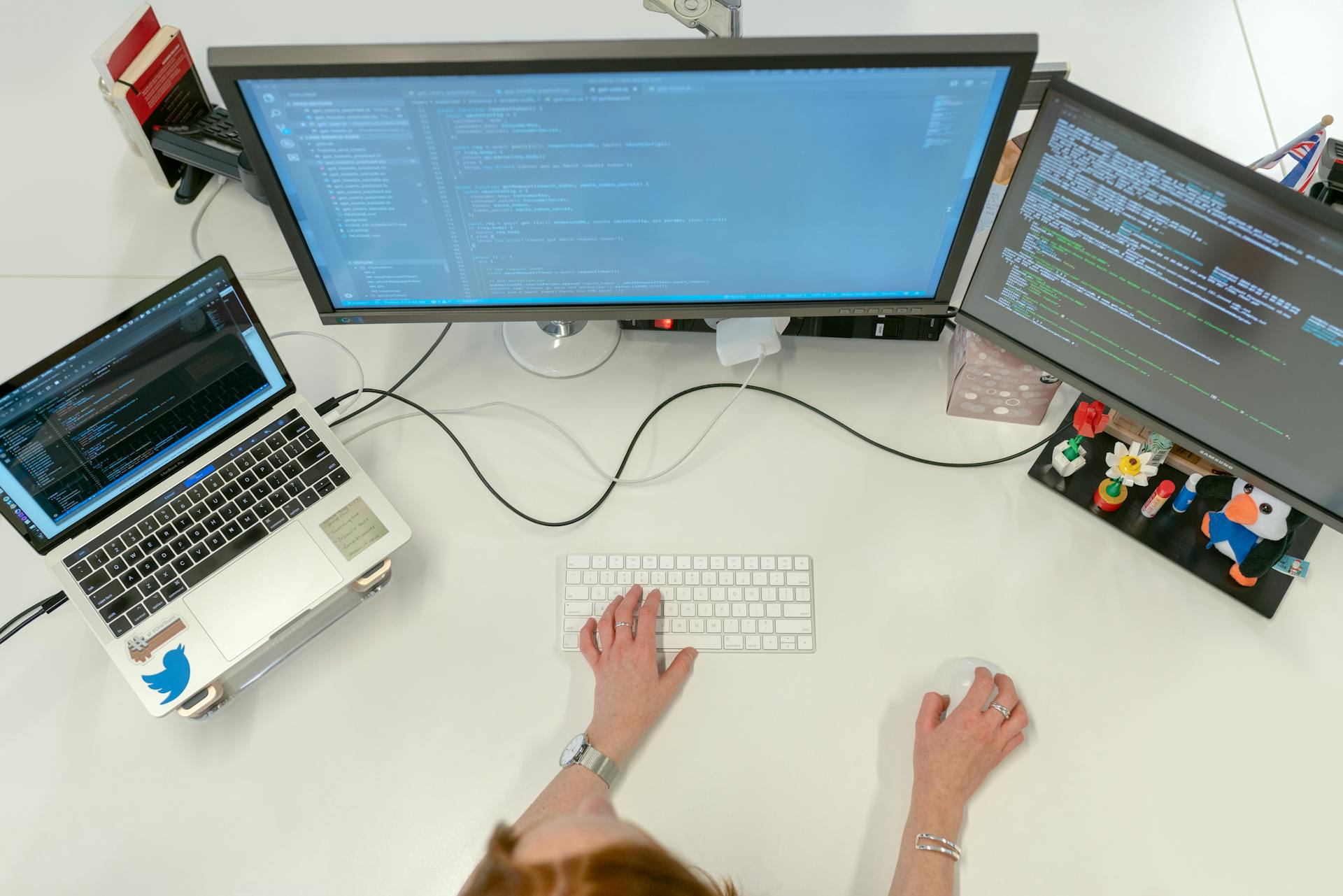
Learning to code can be a daunting task, especially with the numerous options available.
The truth is, coding is a skill that requires dedication and practice.
Most coding bootcamps last around 2-6 months and can cost anywhere from $3,000 to $30,000.
However, some bootcamps offer income share agreements, where students pay a percentage of their income after graduation.
Research shows that coding bootcamps have a higher graduation rate than traditional colleges.
Why Learn to Code
Learning to code can open doors to a world of opportunities. Qualified coders can pursue remote opportunities, working anywhere in the world.
You don't need a formal education to learn how to code, making it a great option for those who want to change careers or industries. Not everyone will enjoy coding, however, so it's essential to consider your interests before diving in.
Learning to code can also have cognitive benefits, such as minimizing cognitive decline and improving reasoning ability. Continued learning may even improve overall health and well-being.
One of the most significant advantages of learning to code is the potential for well-paying tech jobs in various industries. After gaining experience, you can pursue jobs and freelance opportunities, giving you the freedom to work on your own terms.
However, freelance work can sometimes be an inconsistent source of income, so it's crucial to build a portfolio showcasing your work to attract clients.
Getting Started
Learning to code can be a daunting task, but it's essential to start with the basics. Learning to code in bite-sized pieces, starting from easier to harder concepts, is key to success.
The best programming language to learn is the one you feel most comfortable with and that meets your coding goals. Some languages are easier to learn when you're first starting out, such as HTML, CSS, JavaScript, Python, and C.
To get started, schedule time each week to code and make it a habit to code every day. This will help you reinforce your understanding of programming concepts and gradually improve your skills. By practicing regularly, you'll become more proficient and confident in your abilities.
Recommended read: Learn How to Code Google's Go Programming Language
Here are some of the easiest coding languages to get started with:
- HTML: HyperText Markup Language or HTML is the language of the web.
- CSS: Cascading Style Sheets (CSS) works hand-in-hand with HTML to style web pages.
- JavaScript: Web Developers use JavaScript to make websites interactive.
- Python: Python is a highly readable language that's easy for beginners to pick up.
- C: One of the oldest programming languages, C has a simple syntax so it's easier to learn.
Challenges of Learning
Learning to code can be a challenging task, especially for those who are new to programming or have not had the proper guidance or resources available to them. It's essential to have a structured plan when starting out, such as learning the basics of programming concepts and gradually building up to more advanced topics.
Trying to learn everything all at once can make the process more difficult. Learning in bite-sized pieces, starting from easier to harder concepts, can make a big difference.
Learning to code requires a significant time investment, which can be a challenge for those with busy schedules. However, it's a skill that can be developed with consistent effort and practice.
Some people may find that learning to code is not enjoyable, which can make it harder to stick with the process. But, it's worth noting that continued learning may minimize cognitive decline and improve reasoning ability and other health benefits.
Here are some common challenges of learning to code:
It's essential to be aware of these challenges and take steps to overcome them. By having a structured plan, learning in bite-sized pieces, and finding ways to make the process enjoyable, you can set yourself up for success in learning to code.
Build and Get Feedback
Building projects and getting feedback are essential steps in your coding journey. This process will help you identify your strengths and areas for improvement, making you a better coder.
Sharing your coding projects with others can feel intimidating, but it gets easier over time. Getting feedback from others will help you pinpoint your weaknesses and improve your skills.
As you work on projects, don't be afraid to ask for help or collaborate with others. The coding community is supportive and diverse; you can learn much from others.
Here are some benefits of sharing your projects and getting feedback:
- Identifies strengths and areas for improvement
- Helps you become a better coder
- Provides opportunities to learn from others
Linda suggests that as you work on projects, you should "don't be afraid to ask for help or collaborate with others." This iterative process will help you grow as a coder and gain valuable experience.
On a similar theme: Books to Help Learn Code in Java
Mobile App Developer - Entry Level
You can become a mobile app developer with a two or four-year degree in computer science, but non-degree options like mobile app development bootcamps or online courses are also available.
To get hired as a mobile app developer, you'll typically need experience in technical skills like JSON and Node.js.
Mobile app developers create, test, and deploy apps, and may also manage app store activity to maintain quality standards.
They work in various industries, including information technology, healthcare, retail, and finance.
Mobile app developers can advance to lead or senior positions, or project management or business analysis roles.
Here are the typical requirements to become a mobile app developer:
- Education: Two or four-year degree in computer science, or mobile app development bootcamps or online courses.
- Experience: Technical skills like JSON and Node.js, as well as experience in other areas.
- Average Salary: $76,523 per year as of October 2022
Junior Software Developer
Getting started as a Junior Software Developer can be an exciting and rewarding career path. You typically need a four-year technical degree, but some small companies may not require a degree, according to a 2020 HackerRank report.
The job outlook for Junior Software Developers is strong, with a 25% growth rate expected from 2021 to 2031. This means there will be plenty of opportunities to find a job or advance in your career.
You'll need to have programming experience, which you can demonstrate through internships and portfolios. Employers typically require this experience, so it's essential to build a strong portfolio showcasing your work.
As a Junior Software Developer, you can expect a median salary of $109,020 per year. This is a competitive salary, and with experience, you can move into senior software development or management roles.
Here are some key requirements to keep in mind:
- Education Required: Typically a four-year technical degree, but some small companies may not require a degree.
- Experience Required: Programming experience, demonstrated through internships and portfolios.
- Median Salary: $109,020 per year.
- Job Outlook: 25% growth rate expected from 2021 to 2031.
Camps
Getting started with coding can be a thrilling experience, and one of the best ways to dive in is by attending a coding camp. At Preface School of Technology, they offer comprehensive coding bootcamps for all ages, from kids to adults, across 15 different locations at various convenient times.
Their coding camps are structured and intensive programs that help learners learn key coding skills in an accelerated curriculum. This is one of the fastest ways to go from zero to hero in coding.

If you're looking for a coding camp for your kid, Preface School of Technology offers a range of courses, including Fun with Code (Age 4-5), Grow with Code (Age 6-8), and Innovate with Code (age 8-9).
Here are some of the coding camps offered by Preface School of Technology:
- Fun with Code (Age 4-5)
- Grow with Code (Age 6-8)
- Innovate with Code (age 8-9)
- Full Stack Web Dev (Age 12+)
- Bootcamps
Their coding camps are designed to be fun and engaging, while also providing a solid foundation in coding skills. Whether you're a kid or an adult, Preface School of Technology's coding camps are a great place to start your coding journey.
Career Opportunities
New coders can apply for entry-level jobs after completing a training program, such as a coding bootcamp, and can pursue careers in various industries.
Graduates of any age can apply for roles like data analyst, software developer, and IT support specialist, which often don't require years of tech education or experience.
Some of the entry-level jobs available to new coders include data analyst, software developer, and IT support specialist.
After gaining experience, you can pursue well-paying tech jobs in a variety of industries, including finance, healthcare, and education.
High Income Potential
Programmers and developers are in high demand all over the world, making them a lucrative career choice.
Companies are willing to provide attractive packages to them, with a median salary of a developer or programmer in Hong Kong being HK$33,800 per month.
This is significantly higher than the median monthly income for the general HK labour force, which was HK$19,800 in December 2023.
The salary range for developers and programmers in Hong Kong is quite broad, from HK$15,600 to HK$53,800 per month.
Careers for New Coders
As a new coder, you might be wondering what kind of career opportunities are out there for you. Fortunately, it's not too late to learn coding, and you can pursue entry-level jobs without years of tech education or experience. After completing a training program, like a coding bootcamp, you can apply for various roles.
Some common entry-level jobs for new coders include roles like software developer, data analyst, or UX designer. These jobs are available in various industries, and you can work remotely, giving you the freedom to work from anywhere in the world. This is one of the benefits of learning to code, as it opens up many opportunities for remote work.
To get started, consider setting a goal for what you want to make or the problems you want to solve with your coding skills. This will help you stay motivated and focused on your learning journey. Ask yourself questions like "What do I want to make?" and "Which languages will I need to make it?" to help you come up with a clear goal.
Here are some common entry-level jobs for new coders:
Real-World Applications
Coding isn't just for techies anymore. With the rise of coding boot camps and online resources, learning to code has become more accessible than ever.
You can now build a career as a web developer with just a few months of intense learning. According to a coding boot camp, 71% of graduates find employment within 120 days of graduation.
Many companies are now using coding skills to solve real-world problems, such as analyzing customer data to improve business decisions. A data scientist can earn up to $118,000 per year by applying coding skills to business challenges.
Automating tasks is another real-world application of coding skills. With coding, you can automate tasks such as data entry, bookkeeping, and even social media management.
Debunking Myths
The notion that AI will replace the fundamental problem-solving and logic skills required to be a successful developer is a myth.
The demand for talented developers won't slow anytime soon.
Learning to code is not about memorizing a specific programming language, but about developing problem-solving and logic skills that underpin every programming language.
The role of a developer encompasses more than just programming proficiency; it entails problem-solving, creativity, adaptability, and ingenuity.
The industrial revolution shows that automation can accelerate society, but it also leads to more exciting challenges and problems to solve.
The better you are at programming, the better you will be at using AI for programming, including asking the right questions and correctly interpreting and applying responses.
Readers also liked: Generative Ai Code
Sources
- https://www.theatlantic.com/technology/archive/2023/09/computer-science-degree-value-generative-ai-age/675452/
- https://www.multiverse.io/en-US/blog/is-coding-hard
- https://www.preface.ai/blog/why-coding-is-important/
- https://www.educative.io/blog/is-computer-science-major-worth-it
- https://www.computerscience.org/resources/age-to-code/
Featured Images: pexels.com

